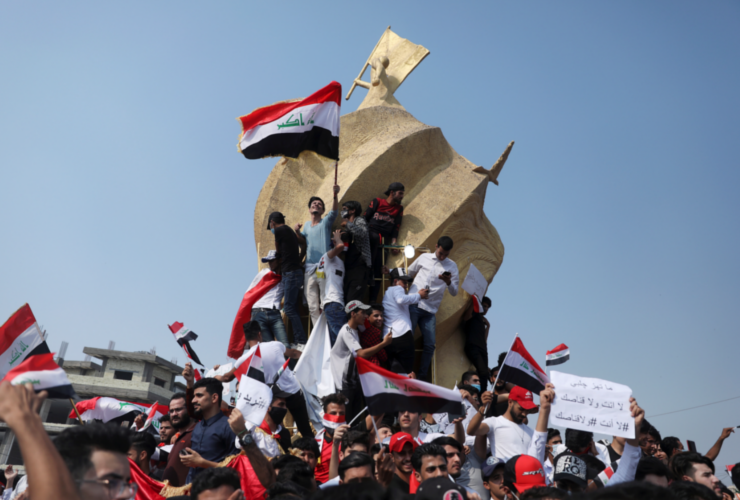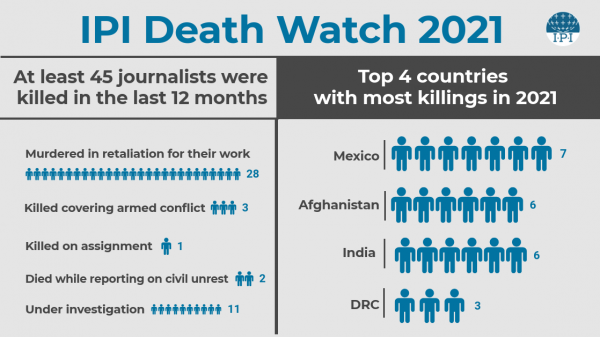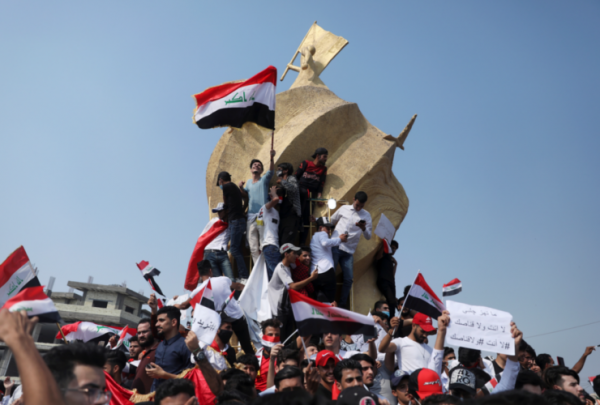The International Press Institute (IPI), a global network of editors, media executives and leading journalists for press freedom, today expressed concern over a recent upsurge in attacks on media outlets covering unrest in Iraq and called on authorities to ensure the safety of all journalists reporting on protests.
Last month, IPI documented several violations in the previous spate of demonstrations, which saw reporters arrested and beaten, widespread internet shutdowns, and the storming of six different national and international TV stations in Baghdad.
After a two-week lull in the violence, on Friday, October 25, the country plunged back into a new wave of deadly anti-government protests as demonstrators took to the streets across the country once again to demand an end to corruption and better public services.
As violence escalated over five consecutive days and the government moved to regain control, journalists and media outlets documenting the events again became targets of violence.
Among the incidents recorded since October 25 were attacks on several journalists by riot police, numerous arrests of reporters, a blanket ban on live coverage from the protests, and raids on radio and TV broadcasters.
Mustafa Nasser, president of the Press Freedom Advocacy Association in Iraq, told IPI his organization has recorded “unprecedented violations” against journalists, particularly in the city of Karbala and the capital Baghdad.
The Association also recorded several death threats against reporters, the firing of live bullets and tear gas towards journalists, and numerous cases of beatings and obstruction by police, he added.
“The Iraqi security forces are using the same heavy-handed measures we saw them deploy earlier this month”, IPI Director of Advocacy Ravi R. Prasad said. “We call on the government to ensure that police refrain from targeting media during protests, immediately stop the raids on broadcasters and reverse all restrictions the ability of reporters to do their job properly.”
Recent attacks on journalists and media outlets in Iraq
Arrests and attacks
On October 25, Al-Sumaria TV reporter Hisham Wassim was hit in the face with a tear gas cannister while covering protests in Tahrir Square in central Baghdad. Change Channel reporter Mohammed Qader, and Al Taghyeer correspondent Mohammed Qadirduring were also beaten by riot police while covering the same demonstrations. On Saturday 26, Ali Jassim Mohammed, a cameraman for Al-Sumaria TV, was then hit by shrapnel from an exploding tear gas cannister and suffered minor injuries.
On Sunday, October 27, Hussein al-Amel, a correspondent for the independent daily Arabic newspaper Al Mada, was arrested by counter-terrorism agents at his home around 3 am, according to the Press Freedom Advocacy Association (PFAA) in Iraq.
The same day, Al-Iraqiya TV reporter Thamer al-Shammari and cameraman Ihsan Ibrahim were reportedly beaten and prevented from entering Tahrir Square by demonstrators unhappy with the station’s coverage of previous wave of protests.
Several injuries were also reported from journalists covering protests in Karbala province on Monday and Tuesday. The National Union of Iraqi Journalists also documented the arrest of a Russia Today photographer Karar Hazem and the injury of Reuters cameraman Maher al-Mashhadani. Al-Itijah TV reporter Mohammed Abdul-Hussein and I News reporter Haidar Hai were reportedly among those arrested.
Coverage ban
On October 25, the Iraqi Interior Ministry announced all media outlets would be temporarily be banned from broadcasting live from demonstrations or direct coverage of the protests.
The same day, Jordan-based Iraqi satellite broadcaster Tigris TV channel, one of the most watched news channels in Iraq, was ordered to stop broadcasting inside the country by the Media and Communications Commission, which accused the outlet of violating professional standards during its coverage of the unrest. Tigris was among those the IPI documented being attacked in the previous wave of attacks on broadcasters.
Meanwhile, on October 27, Saudi broadcaster Al-Arabiya and its sister network Al-Hadath were also banned by the Iraqi government from operating within the country. Both outlets had their license revoked and reporters were asked to stop any journalistic activity inside Iraq.
Broadcasters raided
After the bans came into effect, a number of broadcasters were targeted in police raids and attacked by protesters. On Saturday October 27, a group of protesters stormed the headquarters of Al-Diyar satellite channel in Baghdad, vandalized the offices and assaulted staff members, according to the PFAA.
The next day, security forces also stormed the headquarters of New Generation Radio and arrested a number of its employees, including Saad Al-Ramahi and Rami Karbouli.
Other outlets were subjected to editorial pressure. Over the weekend a number of media outlets in Nassiriya were contacted by local government and security officials who reportedly asked them to stop their coverage of the demonstrations. Journalists in the region have also been put on “kill lists” spread around social media.
More than 220 people have died across Iraq since demonstrations broke out at the beginning of October.



